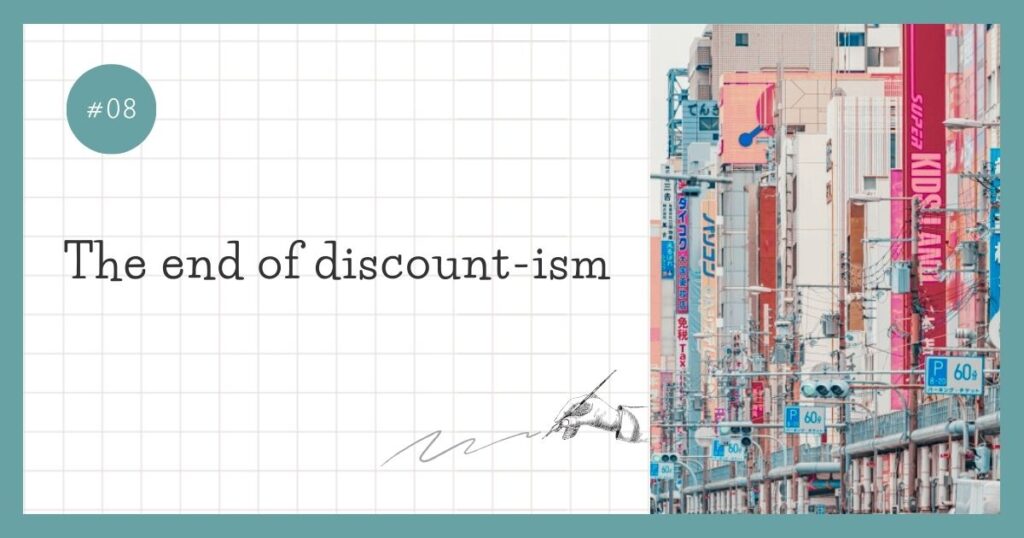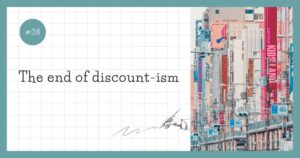
Habit of talking frankly about money
Denden Town stretches along Osaka’s Sakaisuji-street.
When I walked into a store, I was often approached by store clerks who said, “If there is a product you are interested in, I will study it for you!“
Just to be clear, it is an expression that appeals for discounts on products in the Kansai dialect. This clerk is not the Kansai’s Goethe who likes to keep learning.
This is Osaka, the land of Glico, Takoyaki (octopus dumplings), and foodie delicacies. No one studies.
During social studies class, when I cut a picture of a Buddhist statue with scissors and pasted it in my notebook, my friend said, “If you need it, use mine!”
It’s a bad area where we share photos with each other in a passionate friendship, and as a result, each other’s reference books are in tatters.
In Kansai, the custom of talking frankly about money is deeply rooted, from the price of the clothes you are wearing, the rent you pay, your salary at work, to your savings.
People from different parts of the country may be surprised to hear, “What a bunch of delicatessen people!” They may be surprised.
The only people who can be attentive are those who live near Ashiya, where the ikari supermarket is located. It is useless to expect delicacy from a madam who has the dedama supermarket in Osaka as her territory.
The Kansai madam, who thinks the “P” in Privacy Mark is a parking space, is a group of hackers with no malicious intent who frequently access personal information as if they were greeting you.
Even if you manage to answer them after much hesitation, they are actually not that interested in you, which is why they are so tough.
The information that these hyenas enjoy the most is not actually the correct amount of money.
If it’s an item, you got it at a percentage discount. If it is a house, the rent is cheaper than it looks. If it is a salary, it is enough to share “whether it is a good deal or not,” such as “the salary is more than the job.
Cheap! Cheap! Culture
When this electronics district was still lively, store clerks would come to me when I was looking at home appliances at the eaves of a store and appeal how much they could discount from the price tag.
Normally, the explanation of the product should come before the price, but in Osaka, where common sense does not prevail, the shopkeepers would suddenly try to win the battle with the weapon to which customers would respond most.
In the worst cases, the store will say, “That store is too expensive, so there’s no point in going there!” or “If you make a decision now, we will lower the price even more!”
“This is the best I can do!” “What was the price they were talking about so enthusiastically just a few minutes ago?”
I felt that this store, which had just barely made the best price and then immediately lowered the price by another level, might be even worse than the three-ahead other stores.
I felt that this kind of “It’s cheap! cheap!” In the electronics stores of the Showa period (1926-1989), which were infested with such a culture, if you put your hand on your cheek like Rodin’s statue and acted like a potential buyer, the price would come down to a fair price without any need to negotiate.
If we put in considerable effort, we could aim for the lowest price, but I do not want to go to that much trouble.
Nowadays, when we are required to take the initiative in our work in anything, such as improving business efficiency, eliminating waste, and KAIZEN, I want to spend my time leisurely in a “wait-and-see” attitude in our daily lives.
The Narrow Path to Deals
It is common to see people asking for discounts at electronics retailers, citing information posted on the Internet site Kakaku.com.
Nowadays, the number of sales clerk who rush into a store with a “I’ll study it!” Perhaps the fashionable reskilling has awakened the Goethe of Kansai to study.
It is true that the process of researching products in advance, checking actual products in stores, and acquiring the desired product is very efficient. I have grown weary of life.
Perhaps it is because the good old “Den-Den Town“ shopping experience remains in the back drawer of my minds.
I have often ridiculed the ladies at the dedama supermarket for their insensitivity, but I want to tell someone about this saga of “I was able to get a great deal on an originally expensive item by negotiating with the store clerk!“
You may have heard the announcement at Big Camera, Yodobashi Camera, or Yamada Denki, “If the price is even one yen lower than at other stores, please let us know!“
This announcement is a challenge by electronics retailers to the general public.
“If you want to get the satisfaction of a good deal, go ahead and attack yourself with your weapons!” They inspire us to do the same.
Remembering Steve Jobs‘ famous speech at Stanford University, “Be hungry, be stupid!” and with all the courage you can muster, ask, “Can you make this a little cheaper?”
In truth, “Could you study?” would have been a more interesting way to convey the message, but I can’t be that stupid.
And even more so, if a clerk who could not understand my Kansai dialect asked me back, “What do you mean?” I would be so embarrassed that I would have to withdraw completely from the discounting front.
Not everyone can become Jobs so easily.
“I’m sorry, but we can’t give you a discount on this item,” said a young man in a red vest.
He made no pretense of coming to the negotiating table. This man behaved as if he were the king of a dictatorship.
I see. “The narrow road to Otoku is steeper than I had imagined”.
This is Tokyo, with its Hachiko, monja, and Kaminarimon gate. it’s time to show the smartphone inro hidden in my sleeve.
“You minions of the Red Empire. Do you not see this Nojima price?” .
The announcement echoed through the third floor of the store. The time had come.
The young man in red, whose expression did not change as I was convinced of his victory.
Looking at the screen, he said, “This is the difference in points!” He was like a young Cao Mengde from anime “Souten Kouro”.
He says that different points of sale at different stores appear to be the price difference.
“I can’t just leave after such a disappointing exchange!” I tried again to negotiate for a product that was almost at the list price.
“I’ve seen this product in a lot of commercials lately; can I get a little discount on it?”
“I’m sorry, I can’t give you a discount.”
What is this inflexible clerk? I could not face the Kansai-madam who was watching me from behind the grassy knoll…
I had to give them a shot, so I said, “This is the regular price, isn’t it? (There must be room to lower the price!)” but, he brushed it off with, “That’s the price specified by the manufacturer“.
It seems that the consumer electronics discount-ism, which had reached a turning point from wait-and-see to aggressive discounting, has somehow entered an era in which there is no discounting itself.
The in-store announcement will soon change to, “If you find a product that is not at the manufacturer’s specified price and is even one yen cheaper than at other stores, please ask us for a discount.

